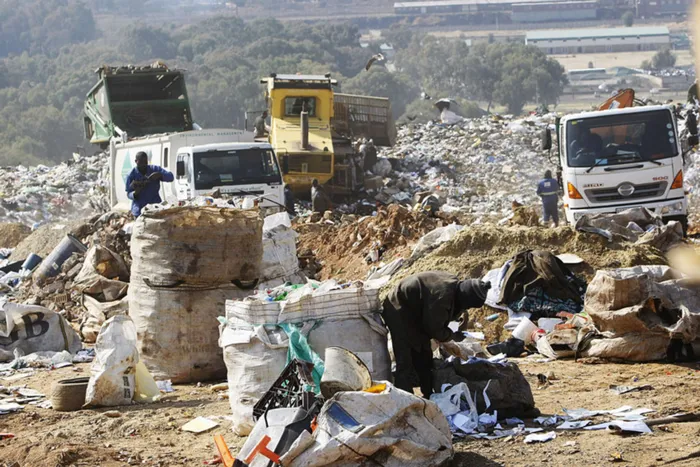Recycling mountains of waste can create gold mine of unskilled jobs

A man packs his bag at a Pick it Up dumpsite in Turfontein JHB. (058) Photo: Leon Nicholas A man packs his bag at a Pick it Up dumpsite in Turfontein JHB. (058) Photo: Leon Nicholas
Nompumelelo Magwaza
Recycling waste has the potential to create 10 times more jobs than dumping it by collecting, sorting, transporting and reprocessing it, according to a UK Friends of the Earth study.
The 2010/11 study suggests that if 70 percent of the waste collected by municipalities in the UK was recycled, 51 400 jobs would be created.
In Europe, if a target of 70 percent for recycling of key materials was met, 322 000 direct jobs could be created in recycling an additional 115 million tons of glass, paper, plastic, ferrous and non-ferrous metals, wood, textile and biowaste, the study said.
Waste recycling has also started to look promising in South Africa as more and more municipalities, which hold rights to landfill sites, are starting to give some recognition to waste pickers.
Dorota Boltman, a divisional director at Rainbow Paper Management, a subsidiary of Metrofile Holdings, said that in the recycled paper preparation process there were multiple job roles, including collectors, sorters, baler operators, forklift drivers, cleaners and truck drivers.
“At Rainbow Paper Management, a sorter or cleaner handles an average of 2.3 tons of paper a day, with a team of people taking about 40 tons a day through the whole preparation cycle,” she said.
Boltman said another benefit of job creation in the recycling industry was that there were positions for people with almost any level of skills and education. “In terms of buying and selling paper, no qualifications are needed but trading experience is most beneficial.”
Musa Chamane, the waste campaign manager at environmental justice organisation groundWork, said that more jobs could be created if waste pickers were given due recognition and protected.
He said about four municipalities in South Africa had started supporting co-operatives by providing them with a piece of land at landfill sites. The land, he said, would be used to build a separation warehouse for co-operatives.
The uMgungundlovu district municipality has put aside R10 million for waste projects which will benefit about 75 waste pickers in the area.
The co-operative will run the warehouse for five years without paying rent to the municipality. “The workers will have protective uniforms and nose-masks at no charge. This will enable them to sell material directly to the recycling companies,” he said.
Chamane said similar projects had been adopted by the Mooi River municipality, in Sasolburg and in Pretoria.
Simon Mbatha, the national co-ordinator for the SA Waste Pickers’ Association, which was formed in 2009 primarily for waste pickers at landfill sites, said the association membership had grown from 10 000 in 2009 to about 25 000 this year.
Mbatha said waste recycling would create more jobs if waste pickers were given an opportunity to separate, clean and bale, and transport the waste. “As waste pickers we need to have a direct connection with recycling companies instead of using a middle-man.”